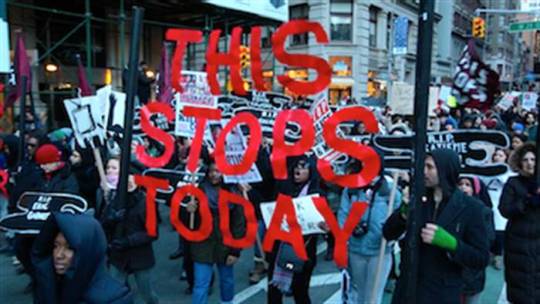Event | Kathleen Foster’s PROFILED Screening
“PROFILED is a powerful documentary and a crucial contribution to the discussion of race and racism in America—both in terms of its economic and ideological impact.” – Pat Keeton, Professor of Communication Arts, Ramapo College of New Jersey
PROFILED is the latest film by Kathleen Foster and is a NYFA fiscally sponsored project. The documentary knits the stories of mothers of black and Latin youth murdered by the NYPD into a powerful indictment of racial profiling and police brutality, and places them within a historical context of the roots of racism in the U.S. Some of the victims—Eric Garner, Michael Brown—are now familiar the world over. Others, like Shantel Davis and Kimani Gray, are remembered mostly by family and friends in their New York neighborhoods.
We updated this post to reflect the next screening and discussion date.
PROFILED Screening Information:
When: Saturday, August 26, 2017, 1:00 PM – 3:00 PM, screening and discussion to follow
Where: Newark Public Library, 5 Washington Street, 2nd floor reading room, Newark, NJ 07102
Ranging from the routine harassment of minority students in an affluent Brooklyn neighborhood, to the killings and protests in Staten Island and Ferguson, Missouri, PROFILED bears witness to the racist violence that remains an everyday reality and gives us a window into one of the burning issues of our time. Foster’s oeuvre includes 10 Years On, Afghanistan & Pakistan (2011), Afghan Women: A History of Struggle (2007), Nicaragua: Reclaiming the Revolution (2001), Lessons in Class Struggle (1998), and Coal Wars: The Battle in Rum Creek (1993). In 2016, we interviewed Kathleen Foster about her artistic process and her approach to social issues in filmmaking.
NYFA: Your films are about social justice topics in a variety of different communities. How do you negotiate the privilege that allows you to enter a community and share its story with a wider audience?
Kathleen Foster: The tremendous outrage at the death of Michael Brown in Ferguson, when thousands of people of diverse backgrounds protested in the streets, showed that you don’t have to be part of a particular group or community to join in their struggles. Many people do it all the time, recognizing that we may not be the targets of a particular injustice, but that we are all in this together.
My documentaries span an era of continuous “forever” war abroad and, since the Great Recession, economic unsettlement and insecurity at home. My films combine elements of history with contemporary documentary footage of the rise of new social movements against war, persistent racism, and wealth inequality. As an activist, I have joined those struggles—from the unjust war in Afghanistan, to the profiling of Muslims after 9/11, to the racist inequality in our society. My involvement led to the production of films that reflect the life and times of our world.
These films draw attention to a problem, dissect that problem, and help people understand social conditions and how we can help change them. They are films about real people as they are affected by social or political events. In PROFILED, the latest film completed this year, the focus is on the raw and brutal effect of policing in the United States today, told from the point of view of the families of the victims of police murders.
NYFA: What strategies might you offer to young filmmakers who are interested in making films about social issues?
KF: A critical strategy I would offer to young filmmakers making films about social issues would be, of course, getting involved in an issue you are passionate about. That means getting to know communities that are dealing with that issue, taking part in activities, educating yourself about the subject, listening to what people most affected by the issue have to say, and interviewing those whose analyses are the most incisive.
The topic should be a matter of concern for a broad group of people but preferably have had little exposure. Attention to the craft of communicating—art, aesthetics, music, a storyline with a sharp focus, flow and pacing of the unfolding of dramatic events—plays an important role in communicating successfully with an intended audience.
NYFA: PROFILED was released this year amidst a summer of violence, police brutality, and national conversations about structural inequality. What are your experiences releasing PROFILED in this climate?
KF: After PROFILED screenings, people in the film have spoken with the audience. These individuals engaged the film audiences in serious conversations about the systemic nature of racism, turning discussions about the painful realities of our racist society into a call for action to build a multi-racial, anti-racist grassroots movement to end inequities. They also provided insights that helped put these injustices into a larger contemporary and historical context. This amazing group includes Natasha Duncan, sister of Shantel Davis, a 23-year-old murdered by the NYPD in 2012; evolutionary biologist, Dr. Joseph L. Graves Jr., (The Race Myth: Why We Pretend Race Exists in America?); Chauniqua Young, one of the Center for Constitutional Rights (CCR) attorneys who pressed the successful federal class action lawsuit against discriminatory stop-and-frisk policies by the New York Police Department; and Jill Bloomberg, Principal, Park Slope Collegiate, whose students took part in the Eric Garner and Michael Brown protests.
Yes, these injustices have been happening for a long time. But in my view, as long as they continue to happen, we have to keep working to bring about change. For audiences not only to see the film but also afterwards to hear voices, such as the ones described above, expressing their commitment and activism, and adding their knowledge, is incredibly inspirational. It is so hard to be patient, but the contributions of such individuals, and I hope the contribution of my films, is to continue to encourage people to work for change UNTIL it comes. We cannot stop.
NYFA: How do you grapple with the fact that the narratives you capture on film are not necessarily resolved or reformed when you stop shooting?
KF: It is so important to remind ourselves that the mainstream media never cover the many actions or the people who are in motion—protesting or organizing—to change injustices. The cumulative effect often for most of us is to think that most people don’t care, or that these problems are too big to solve. When I am out filming or talking to people affected by these injustices, or when I’m present in the community where many people are expressing their desire for change, I am inspired. Being part of these movements, and capturing them on film, reminds me that there are many, many people who do want to see change, and this sustains me. I realize that the work I do is important because it provides a record of these feelings and desires for change, and a record of the fact that many ordinary people ARE actually DOING something.

NYFA: How do you sustain your creative energy?
KF: My ability to keep creating documentaries about these social movements is sustained very much by my understanding of history—my knowledge that there have actually been huge social movements, from revolutions to civil rights movements to others, that have transformed societies as in Russia or China or Cuba—or have brought about dramatic changes in civil rights as in the 1960s in the United States. What continues to amaze me today is that young people who have not experienced such movements or read these histories have, nevertheless, been moved to act. People want a better society for their families and themselves. That is deeply inspirational, and I feel privileged in my role as a documentary filmmaker to be continually engaged in documenting these struggles and meeting these amazingly inspirational individuals and communities. It is this experience that keeps me from being cynical and keeps me hopeful.
NYFA: Why did you begin using fiscal sponsorship to help fundraise for your films?
KF: Foundations, and some private donors, do not give grants to individuals, but only to tax-exempt, 501(c )(3)-classified organizations, like NYFA. NYFA’s Fiscal Sponsorship program allows individual artists like me to raise funds using NYFA’s tax-exempt status as a 501(c )(3)-classified organization.
NYFA: Given the sometimes politically controversial content of your films, has funding been a challenge because of ideological differences? How do you negotiate finding funders and building individual giving capacity?
KF: Funding has been a challenge, as all filmmakers know, regardless of ideological differences. There are many people making films and very few funders. (It is, it seems, easier to get into Harvard with an acceptance rate of around 5%, than to get a Sundance grant.) There is some funding for liberal films that EXPOSE racism or police brutality, but in my experience, a call for ACTION makes funders more nervous. Ironically, more watered-down films can get money and appear to talk about how bad things are, how racist people are, how there needs to be reform within police departments, but that most policemen are “good people.” But to raise questions about the structure of society, about structural inequality, or to talk about the role of “police” in a capitalist society can create unease. I am going to continue to make the films I make with the message I make, but I realize that they will not always be as fundable as films that focus on individual experiences and identity and avoid talking about the economic structures of society.
But I have found that it is possible to find like-minded people, lesser-known foundations and individuals, who make it possible to produce films like PROFILED. And I was gratified by the efforts of a multi-racial group of people who donated time, skills, and money to its production.
Learn more about Kathleen Foster’s work and PROFILED on her website kathleenfoster.com.
NYFA Fiscal Sponsorship allows individual artists and emerging arts organizations in all disciplines the ability to raise funds using NYFA’s tax-exempt status as a 501(c )(3)-classified organization. Under NYFA’s Fiscal Sponsorship, artists and organizations can optimize the reach of their fundraising efforts. Deadlines for the program are quarterly; learn more here.
– Interview by Madeleine Cutrona, Program Assistant, Fiscal Sponsorship & Finance
Images: courtesy of Kathleen Foster





